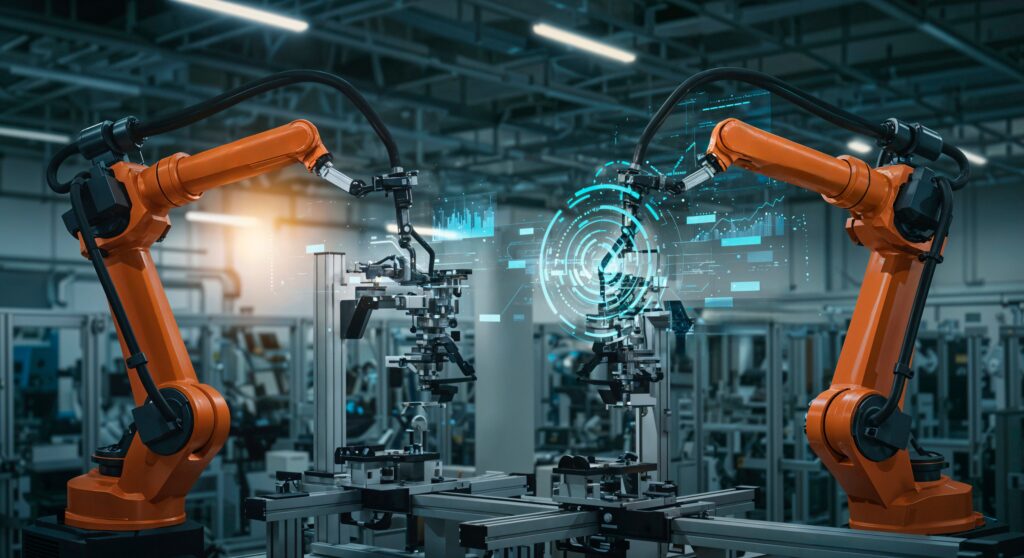Automation Services
FAQs – Automation Services
-
PLC programming in Oman means setting up controllers that automate machines and processes. Whether in oil & gas, water treatment, or factories, PLCs ensure smooth operations with fewer errors. Brands like Allen-Bradley and Siemens are widely used, and professional programming helps with logic design, troubleshooting, and integration with HMI/SCADA. For Omani industries, effective PLC programming keeps systems reliable, safe, and efficient.
-
HMI (Human Machine Interface) allows operators to manage equipment through simple touchscreen displays. In Oman, industries rely on HMI interface development for real-time monitoring of pressure, temperature, and flow. A customized HMI improves usability, reduces downtime, and makes processes easier to control. It’s the bridge between people and complex automated systems.
-
A generator sequence system automates multiple generators to ensure uninterrupted backup power. In Oman, it manages start/stop control, load sharing, and sequencing. This saves fuel, balances load between units, and reduces wear. It’s especially useful for facilities with high energy needs, from factories to hospitals.
-
Automatic start/stop detects outages and powers on generators right away. In Oman’s industries, it guarantees fast recovery, smooth load transfers, and fuel savings. By removing manual intervention, it reduces risk, downtime, and maintenance costs.
-
A boiler sequence system automates when boilers start, stop, or share loads. For Omani industries like manufacturing and power, it saves fuel and boosts efficiency. PLC-controlled panels ensure only the boilers needed run, cutting costs while maintaining safety.
-
Burner management systems (BMS) monitor and control the ignition, air-fuel mix, and shutdown of boilers. In Oman, where boilers run in critical industries, BMS prevents accidents, ensures proper sequencing, and meets international safety standards.
-
Instrument control systems in Oman regulate process variables like flow, level, pressure, and temperature. With transmitters and PLC integration, operators get accurate data and control. These systems are essential in oil, gas, water, and power industries for maintaining quality and safety.
-
Flow, pressure, and level transmitters provide real-time data for automation systems. In Oman, they keep operations safe by preventing overflow, pressure drops, or system failures. Calibrated transmitters integrated with PLC/HMI improve accuracy, reliability, and efficiency.
-
SCADA systems give operators centralized, remote access to all process data. In Oman, combining SCADA with PLCs improves monitoring, predictive maintenance, and faster decisions. It’s vital for industries where downtime is costly.
-
Upgrading from analog to digital meters in Oman gives clearer, more accurate readings. Digital pressure and temperature displays also connect to PLC/SCADA systems, making operations smoother and error-free.
-
Popular options include digital pressure meters, temperature displays, panel meters, and Modbus-compatible multi-parameter meters. These give precise readings and integrate seamlessly into modern automation systems.
-
PLC installation includes proper wiring, programming, transmitter connections, and full system integration. In Oman, professional installation prevents misconfigurations and ensures reliable performance in industries like power and oil refining.
-
Transmitter calibration ensures accurate pressure, flow and temperature readings. In Oman, specialists use advanced tools to fine-tune accuracy. Regular calibration reduces downtime and ensures compliance with safety standards.
-
Setting up PLCs, transmitters, meters and HMIs improves real-time monitoring, reduces manual work, and lowers downtime. For Oman’s industries, this translates to better productivity and lower operating costs.
-
Proper logic design makes automation reliable, while troubleshooting quickly fixes faults. In Oman, this means fewer breakdowns, smoother performance, and continuous 24/7 industrial operations.

